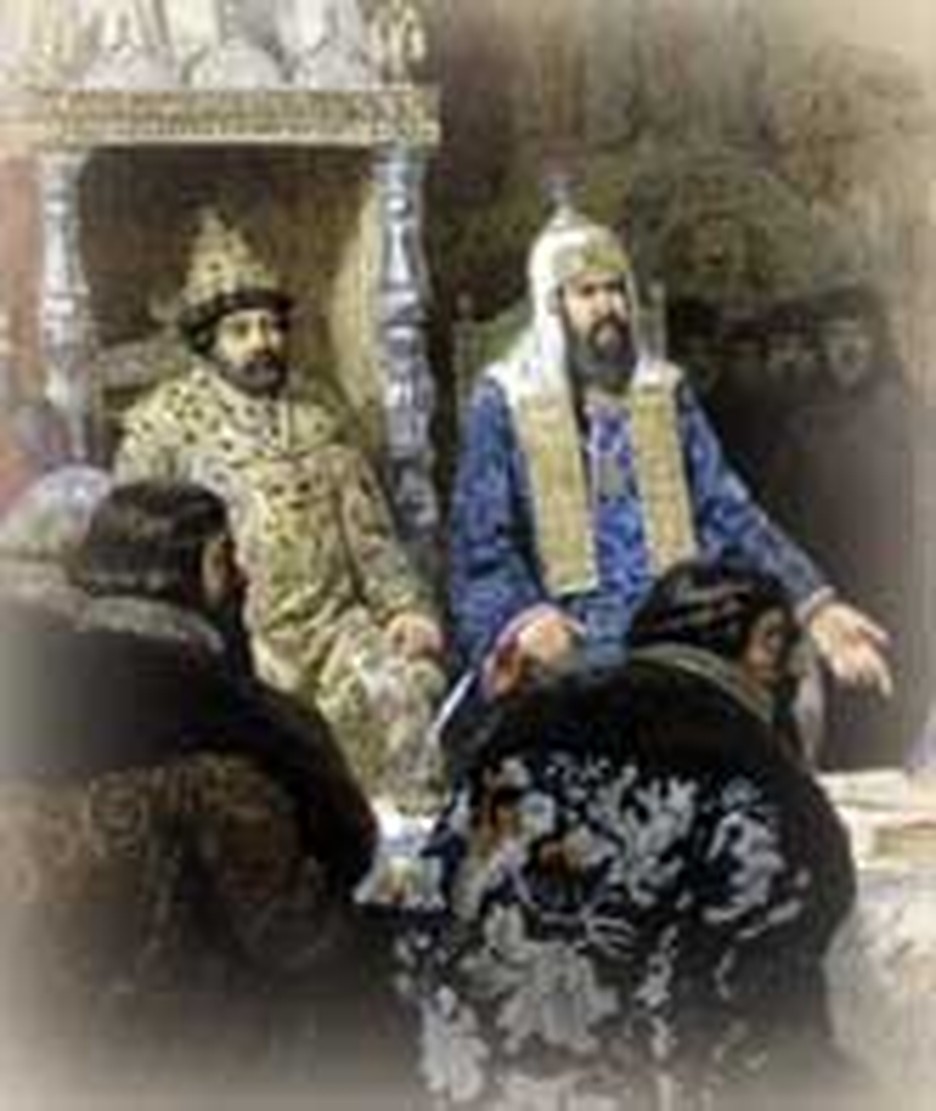
Jesus Christ came in meekness and humility, renouncing the emblems of power and status. He did not impose his ways on anyone or force a form of worship. When his disciples jockeyed for position, he urged them to serve one another. His followers thorugh the ages did not always grasp the implication of this teaching or follow it.
A case in point occurred in the events which led a council to depose Nikon, Patriarch of Moscow, on this day, December 12, 1667.Greek and Russian prelates joined in making the decision, which Tsar Alexis Romanov demanded. The Tsar was easily able to attain his objective because the high-handed Nikon was most unpopular.
Mistakes and mistranslations had crept into the Russian liturgy. For instance, the Russians signed the cross with two fingers, rather than three as the Greeks did. Nikon insisted on reform. But many Christians who grew up with the traditional Russian forms protested the change back to Greek forms. If the Greeks were so correct, why had God placed most of Orthodoxy under Turkish rule? Nikon responded in autocratic fashion and, with full state cooperation, attempted to crush anyone who refused to accept his new service book.
It is not clear why Alexis stepped in; probably he did so because Nikon tried to shake off state control of the church. Under pressure from the Tsar, Nikon resigned, but was reluctant to relinquish his power. He continued to agitate for a restoration of his authority. In fact, he even returned to Moscow and tried to take up his duties as if nothing had happened. The Tsar wanted to replace him, but, to avoid charges that there were two patriarchs, requested that Nikon be formally deposed.
The synod agreed. Anger, hurt feelings, and retaliation were apparent in its decision: "Whereas we have now learned that Nikon lived tyrannically, and not meekly as befits a prelate, and that he was given to iniquity, rapacity, and tyranny, we debar him, in accordance with the divine and sacred canons of the evangelizing apostles and of the ecumenical and local Orthodox councils, from every sacerdotal function, so that henceforth he shall have no power to perform any episcopal act ... and we decree with the entire local church council that henceforth he be known as a common monk called Nikon, and not as patriarch of Moscow; he will be assigned a place to dwell to the very end of his days, and may it be some old and suitable monastery, where he can lament his sins in great silence."
Though he was banished to a monastery on the White Sea, Nikon's reforms were kept. The persecution of Old Believers that he had instigated continued. Later, the dying Alexis implored the forgiveness of the man he had ruined. After fourteen years of imprisonment (which was sometimes very harsh) Nikon was invited back to Moscow by a new Tsar, but he died along the way. He was buried with full honors.
Bibliography:
- Avvakum Petrovich. The Life of the Archpriest Avvakum , by himself. Translated from the seventeenth century Russian by Jane Harrison and Hope Mirrlees. With a pref. by Prince D.S. Mirsky. London, Hogarth Press, 1963.
- Fortescue, Adrian. "Nikon." The Catholic Encyclopedia. New York: Robert Appleton, 1914.
- "Nikon." New Schaff-Herzog Encyclopedia of Religious Knowledge. Grand Rapids: Baker Book House, 1954.
- "Nikon." The Oxford Dictionary of the Christian Church. Edited by F. L. Cross and E. A. Livingstone. Oxford, 1997.
- Various church histories and histories of Eastern Orthodoxy.
Last updated May, 2007.


